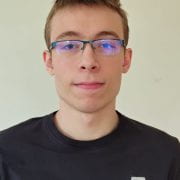Jacob Swindell
Research Interests
Mobile Autonomy / Manipulation and Soft Robotics
Presentations
- “Discrete Gaussian Process Representations for Optimising Drone-based Precision Weed Mapping” (poster) – AgriFoRwArdS CDT Annual Conference 2024: Robots in Action [July 2024] – Norwich, UK.
- “SLAM (Simultaneous localisation and mapping)” (oral) – AgriFoRwArdS CDT Summer School: Robotic Phenotyping [July 2024] – Wageningen, The Netherlands.
- “PATHFINDER: Precision Agriculture through High-Fidelity Flight Navigation and Exploration Routing” (poster) – AgriFoRwArdS CDT Summer School: Robotic Phenotyping [July 2024] – Wageningen, The Netherlands.
About me
My name is Jake, I have lived in the Lincolnshire area for the past 10 years and have recently completed my undergraduate degree in Computer Science at the University of Lincoln.
I was introduced to the field of robotics through a summer project with LCAS at the University where I worked with the Tiago robot on a door opening problem that involved computer vision and manipulation. For my dissertation I went on to integrate a fleet management system with some Turtlebots and develop a web interface to interact with them.
I joined the CDT because I wanted to explore my interest in this field of study more and I believe that robotics can provide valuable solutions to the many interesting problems from the agricultural sector.
MSc Project
Discrete Gaussian Process Representations for Optimising Drone-based Precision Weed Mapping
While current industry systems often rely on orthomosaics, research is being done on the use of 2D GP for weed mapping. Research typically uses gridmaps or quadtrees as discretised representations of the continuous GP. This project aims to evaluate different discrete representations for a 2D GP. These different representations come from areas such as image compression and georeferencing systems. In these areas, each representation is used in specific cases based on the underlying data it is representing. Additional representations will be evaluated based on how well they can represent the ground truth, their computational complexity and their suitability for use in path-planning algorithms. By evaluating these other representations this project aims to find if a better representation than the current Quadtree / Gridmap approach exists for weed mapping.
PhD Project
PATHFINDER: Precision Agriculture Through High-Fidelity Flight Navigation and Exploration Routing
The PATHFINDER project leverages UAV technology and deep learning advancements for efficient agricultural mapping, aiming to overcome current UAV limitations through an adaptive, high-resolution data capture methodology. Traditional UAV flight plans are rigid and lack responsiveness to real-time changes, but PATHFINDER introduces an online planning algorithm using a Gaussian Process (GP) regressor for real-time data integration and uncertainty mapping. This approach optimizes UAV paths, focusing on high-information areas and varying altitudes to maximize efficiency and information gain. The project combines desk-based algorithm development with practical in-field testing, ensuring robust, applicable solutions, and moves away from orthophoto representation, exploring alternative formats and a discretized approach to reduce computational complexity. The student involved in PATHFINDER will gain hands-on experience in developing and testing advanced algorithms, conducting simulated and real-world data collection, enhancing their skills in computer science, robotics, agricultural science, and data analytics, and solving real-world agricultural mapping challenges, providing a unique blend of theoretical knowledge and practical application to equip them for future careers in UAV technology and agricultural remote sensing.
Jacob’s PhD project is being carried out in collaboration with FarmB under the primary supervision of Dr Riccardo Polvara.

